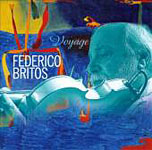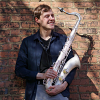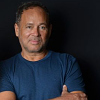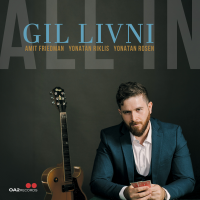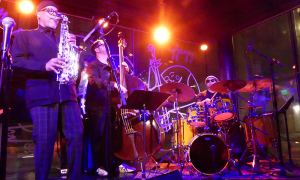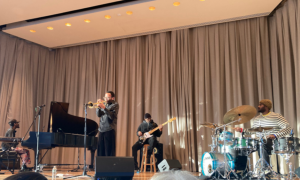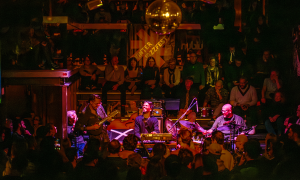Home » Jazz Articles » Live Review » 31st Annual Tri-C JazzFest Cleveland
31st Annual Tri-C JazzFest Cleveland
Cleveland, Ohio
April 15-25, 2010
In its 31st offing, the Tri-C JazzFest Cleveland followed a familiar yet engaging formula. One that, over the years, has made it the largest music festival in Ohio and the largest educational jazz festival in the country. The clinics and workshops for local musicians, as well as performances by local high school and college bands, remained intermixed with shows by international stars. And throughout its 11-day run, while offering at least a taste of all that jazz has to offer, the festival still maintained a distinct Cleveland flavor.
April 16: Happy Birthday Henry Mancini!
A bit of luck befell the festival this year. After previously scheduled Broadway singer Vanessa Williams canceled in January, organizers picked up singer Monica Mancini's tribute show to her late father. As fate would have it, Friday also happened to be the 86th anniversary of Mancini's birth. So the night at the Allen Theatre was touted as a birthday celebration for one of Cleveland's famous native sons.

Sean Jones
The Cleveland Jazz Orchestra got things underway. Led by emerging trumpeter Sean Jones, the band favored upbeat swing versions of a variety of Mancini compositions, including "Cheryl's Theme" from the film Sunset, the title song from Breakfast at Tiffany's and the dreamy, majestic "Theme From Mr. Lucky." A list of jazz stars new and old were trotted out to spark the music and crowd alike. Jones traded solos with local sax star and orchestra member Howie Smith on the opening number, then brought out another rising young trumpeter from Cleveland, Dominick Farinacci, who lent his flugelhorn to the second piece. Pianist Mulgrew Miller and saxophonist Ted Nash entered for "Lujon" and carried the ballad down moody, rain-soaked streets. Miller exercised an impossibly supple touch on the keys, pouring forth choruses of milky favor. Trombonist Wycliffe Gordon came on for "Breakfast at Tiffany's," but didn't really get groovin' till a few tunes later (with a charging statement that squeaked, pitched, rolled and growled), following on the heels of clarinetist Paquito D'Rivera, who thrilled the audience with his woodwind gymnastics and gregarious personality. Guitarist Royce Campbell, who played in Mancini's band for 19 years, entered for "Dreamsville," and stayed on for most of the night, occasionally picking (or thumbing) out vibrant, Wes Montgomery-like solos.

Monica Mancini
Monica Mancini's pianist Mamiko Kitaura and the singer's husband, drummer Gregg Field, joined the band after the intermission, leading the orchestra through the Pink Panther theme, while the animated feline pranced on the screen behind the musicians, before giving way to clips from several of the famous Inspector Clouseau movies. Mancini herself came on to sing "It Better Be Tonight." And with a full, able voice, she continued to run through a number of her father's hits, including "Two for the Road," which featured D'Rivera's clarinet, "Charade," "Dear Heart," "Days of Wine and Roses" and "Moon River." But the highlight was a wild rendition of Henry Mancini's surging, iconic theme from the Peter Gunn TV show, which allowed all the aforementioned guests ample room to strut their wares. It provided a rousing blast to an otherwise nice, if overly sentimental, tribute from daughter to father.
April 17: Women In Jazz
After missing last year's installment of the festival's long-running Women in Jazz series, singer Evelyn Wright was back in fine form at this afternoon tribute concert to Brazilian guitarist/composer Antonio Carlos Jobim at the Mt. Zion Congregational Church. Also on the bill were singers Pat Harris and Marsha Newman. The three each ran through a trio of Jobim songs in the opening set, backed by a quintet under the direction of guitarist Gary Edwards. Harris proved the most capable and at home singing in Portuguese, losing none of her expressiveness—in fact, increasing it—when she did so. Newman also gamely switched to Portuguese in parts of "Sadness." But both singers labored a bit in blending soul/R&B/gospel vocal styles with Jobim's bossa melodies, the result at times sounding flat and disjointed. (Their efforts were certainly not helped any by continuing technical problems with the microphone.) Only Wright was able to fully inhabit the maestro's humid but breezy hymns, infusing them with the metal urgency and desperation of the American city. The band was solid in support throughout and offered up several funky electric bass solos by Kip Reid, echoing guitar comps from Edwards, and many sharply rendered piano solos by Jackie Warren, who reached her height with an extended clamoring statement on the penultimate "How Insensitive."

Evelyn Wright
April 17: The Roots
After seven years of featuring a Jazz Meets Hip-Hop show at its festival, Tri-C went full-fledged this time around, inviting the innovative, Grammy-winning group The Roots to perform at the Allen Theatre. And, as anyone who has followed The Roots' music would fully expect, the group's performance didn't lack for a crossing of musical boundaries and ideas—the hallmark of the shelved (at least for a year) Jazz Meets Hip-Hop series. Combining thundering drums and percussion, keyboard, rock guitar, electric bass and sousaphone with rap and soul/rock vocals, The Roots blasted out a non-stop stylistic amalgamation that showcased the individual chops of the group's members—skills only hinted at on their studio efforts.
While as highly regarded for their songs' lyrical content as for their musical diversity, some of that vaunted social-consciousness and critique were, honestly, lost in the high-decibel output (unless you already knew the words), but the power of their presentation and, again, the blending of various vocal traditions were a treat of the live performance. MC Tariq "Black Thought" Trotter was the man up-front, rapping hard and fast through band fixtures like "Web," "Star/Pointro," and "Get Busy," but also the blues lyrics of Willie Dixon and Bo Diddley. Guitarist Kirk Douglas handled much of the backing vocals as well as many soul refrains that countered and nicely played off Trotter's raps. Brief quotes—both vocally and with his guitar—from Guns and Roses' "Sweet Child of Mine" and Led Zeppelin's "Immigrant Song," were nice, humorous departures.
While the music rarely stopped (and when it did the musicians froze in the moment, looking like figurines stuck in a lighted shadowbox, until released by the next song), the seventh number cleared the stage of all but drummer Ahmir "?uestlove" Thompson and percussionist F. Knuckles, making for an extended drumming battle that played to and thrilled the crowd, especially as it rose from its steady beating to crash out a multidimensional duet/duel that closed the battle with a fury. Sousaphone player Damon Bryson lent the freshest dimension to the rap outfit simply by being on stage. But he was also, perhaps, the biggest showman and most active member of the group, running and bouncing around the stage—several times leaping onto ?uestlove's drum stand—with an exuberance that would have made you think his large instrument were made of tinfoil.
April 18: Theo Croker / Gerald Clayton
The free Debut Series concert at the Greg L. Reese Performing Arts Center in the East Cleveland Public Library has become a JazzFest staple. Kicking off the show this year was a quartet of Oberlin grads led by trumpeter Theo Croker. With a deep, full tone recalling Ron Miles, Croker favored slow trills that often worked in consort with electric bubbles gurgling from keyboardist Sullivan Fortner's Fender Rhodes. On piano, Fortner launched forceful, angular attacks that included classical and Latin shifts as well as strumming of the instrument's strings. While the group stuck mostly to original Croker compositions, including the swirling "Meditations," wild "Transcend" and anthemic ode to President Obama, "Change," it also gave an inspired reading of "My Funny Valentine" that started from a sensitively fragile, warbling trumpet solo and steadily grew darker until succumbing to a mournful piano passage.

Theo Croker
Sporting a bow tie he claimed he wore only to undo coolly during the show, pianist Gerald Clayton and his trio took the stage shortly after Croker. Aside from "Major Hope," the group's six-tune set stuck to material from Clayton's 2009 release Two-Shade (Decca), but expanded the pieces considerably. "Sunny Day Go," which closed the show, was particularly stretched, at least doubling the 6:45 length of the recording. Such space allowed Clayton ample room to display his emerging voice, one he pounded out with abandon, testing ideas, shifting focus, pushing for more. This didn't always lead to success, and some of the pieces were, perhaps, stretched beyond their means. But there's little question that Clayton, while still a work-in-progress, is a major talent. And his intentions of fulfilling his promise were in full view on this afternoon. Bassist Joe Sanders and drummer Justin Brown, retained from the Two-Shade recording, thundered admirably behind the pianist, often exchanging laughs and nods of approval. Yet it was hard to shake the sense that this was Clayton's gig. That, while the trio's music meshed, the pianist nevertheless was (or was wishing to be) a player apart.

Gerald Clayton and Joe Sanders
April 18: Nora McCarthy
While not actually part of the JazzFest schedule, the return of this Cleveland-native singer (and former stalwart of the city's jazz scene) from New York for a performance at Nighttown fit in well with the hometown spirit the festival always exudes. Featuring several songs from her latest release, Circle Completing (2008), McCarthy's vocals often recalled the soft, strained desperation of another Cleveland vocalist, the great Jimmy Scott. The album is, in fact, something of an homage to Scott, ending with the McCarthy original, "Faith in Time (Jimmy's Song)."

But McCarthy (pictured on right) skipped that one on this night. Instead, Scott's influence shown through on another original composition, the one she calls her theme song, "Life Is a Song to Sing," and on "April in Paris," her vocals fluttering with an acceptance of loss and regret, yet insisting that the road stay open before her; she the more able of treasuring it for her backlog of experiences. Elsewhere, she swung through Van Heusen's "Come Fly With Me" and the original "Into the Middle of Something" with a relaxed cabaret swagger, and pounded out piano-like scatting on other standards. She was backed by the fine local trio of pianist Dan Maier, bassist Marty Block and drummer Roy King. Block, in particular, added a deep, invigorating second voice that countered McCarthy's vocals with slippery yet punching solos on nearly every number. The singer closed with a barn-burning version of Willie Dixon's "Little Red Rooster" that left the crowd crowing for more and nicely "upset, in every way."
April 19: The Cleveland Jazz Initiative / Jack Wilkins
The Cleveland Jazz Initiative is an ever-changing lineup of local jazz musicians founded by saxophonist Bobby Selvaggio and bassist Matt Charboneau. Featuring a frontline on this night of three saxophones and a trumpet, plus keyboards, bass and drums, the group alternated between hard-bop and cool jazz originals in opening for guitarist Jack Wilkins. For his part, Wilkens utilized his full, ringing tone, quick, flowing lines and chunky chords to fuel a set of mostly standards. Local stalwarts, bassist Peter Dominguez and drummer Ron Godale, filled out the trio. One of the night's highlights was a take on Oliver Nelson's "Butch and Butch" that had Wilkens pushing off with a quick, guitar boogie, before venturing into more complicated sentiments. Godale then thundered in with a crashing solo over Wilkens' bluesy riffs, and the guitarist rose later with deep, electric growls. "Rainy Day," which directly followed the Nelson tune, was another standout, with Wilkens clearing the stage for an absorbing, solo guitar treatment. "Kiwi Bird," "So Easy To Love" and "Tico Tico," followed in that order, closing the quick, eight-number set.

Jack Wilkins
April 20: The Eddie Baccus Organ Summit with Tony Monaco
The evening at Karamu House began with a panel discussion on the contributions of late Cleveland saxophonist/composer Willie Smith. Led by the festival's artistic director Willard Jenkins, the amiable, informative panel featured Joe Lovano—whose Grammy-winning album, 52nd Street Themes (Blue Note, 2000), featured Smith's charts—along with local musicians Curtis Avant, Ernie Krivda and Evelyn Wright, and journalist Joe Mosbrook, all of whom knew Smith and his music well.
 The organ summit that followed presented two distinct B-3 styles in the work of Cleveland legend Eddie Baccus, Sr., who favored a swinging line with an analytical edge, and Tony Monaco (on right), who was all-out, sweaty soul. Filled out by vibraphonist Cecil Rucker, saxophonist Chris Coles, guitarist Bobby Curry and drummer Perry Williams III, the group burned through hard-hitting R&B a la Jimmy Smith. Monaco, whose entire body works and suffers with his instrument, contorting his face into all manner of ecstatic grimaces, worked the crowd as is his wont. He went for high thrills and hit most of the time, shooting the audience down with a finger gun after especially tasty solos. Baccus, conversely, displayed little to no emotion, but touched off involving, if less physically powerful, statements that flowed as easily and naturally from him as did his breath. Rucker's vibes were a nice complement to the heavy organ sound, and his solos often surprised by refusing to complete expected lines, shifting instead and using space to patch together sharply cut collages. Coles never quite seemed to be in-step with the rest of the boys, Curry stayed mostly in a nice, bluesy Grant Green mode and Williams kept things steady (his one extended solo, on the group's third number, while eventually climbing to a climax, pounded on statically for so long, the time continuum seemed to shift). In fact, the set as a whole, dragged on a bit too long and was fattened at its middle by the surprise visit (or at least we were led to believe) by singer Michael Cady, who popped out from the wings to take over the show through two R&B jumpers, Horace Silver's "Filthy McNasty" and "Never Make a Move Too Soon."
The organ summit that followed presented two distinct B-3 styles in the work of Cleveland legend Eddie Baccus, Sr., who favored a swinging line with an analytical edge, and Tony Monaco (on right), who was all-out, sweaty soul. Filled out by vibraphonist Cecil Rucker, saxophonist Chris Coles, guitarist Bobby Curry and drummer Perry Williams III, the group burned through hard-hitting R&B a la Jimmy Smith. Monaco, whose entire body works and suffers with his instrument, contorting his face into all manner of ecstatic grimaces, worked the crowd as is his wont. He went for high thrills and hit most of the time, shooting the audience down with a finger gun after especially tasty solos. Baccus, conversely, displayed little to no emotion, but touched off involving, if less physically powerful, statements that flowed as easily and naturally from him as did his breath. Rucker's vibes were a nice complement to the heavy organ sound, and his solos often surprised by refusing to complete expected lines, shifting instead and using space to patch together sharply cut collages. Coles never quite seemed to be in-step with the rest of the boys, Curry stayed mostly in a nice, bluesy Grant Green mode and Williams kept things steady (his one extended solo, on the group's third number, while eventually climbing to a climax, pounded on statically for so long, the time continuum seemed to shift). In fact, the set as a whole, dragged on a bit too long and was fattened at its middle by the surprise visit (or at least we were led to believe) by singer Michael Cady, who popped out from the wings to take over the show through two R&B jumpers, Horace Silver's "Filthy McNasty" and "Never Make a Move Too Soon."
After the show, the party shifted a few blocks east to Togo Suite, where Lovano and Krivda led an open jam session in memory of Willie Smith. The place filled steadily, with tables and chairs being carted here and there to accommodate the crowd that suddenly had packed the club to capacity. The enthusiasm amongst listeners and musicians alike—and the free intermingling of the two, and stars with students—gave one hope for a rekindling of the jazz scene in Cleveland, if only it be sparked more often with such events as this.
April 21: Omar Sosa Afreecanos Quartet
The Museum of Contemporary Art Cleveland has, over the years, hosted the festival's most adventurous sets. This year was no different. Experimental Cuban pianist Omar Sosa (below) led his Afreecanos Quartet through stretching waves of Afro-Cuban beats from the 22nd century. Tucked into the crook of a grand piano loaded down with pedals, effects boards and other various electronic implements, and a Fender Rhodes, Sosa spent the evening interlacing classical flourishes with Cuban dance melodies, disco electronica and looping foreign-language chants and singing sprung from the devices at this fingertips. Saxophonist Peter Apfelbaum worked an array of traditional (African?) woodwind instruments in addition to his tenor, and pulled out an impressive collection of percussion instruments to shake about to the beat. Childo Tomas thumped away on electric bass and drummer Marque Gilmore supplied the polyrhythmic underpinnings.

Culled from the dance-hungry traditions of Africa and Cuba, the music pulsed with an exciting, limb-shaking force. But the heady mixture of traditional and electric sounds with voices both live and recorded, often reflected the shrinking world's violent clashing of cultures more than any smooth, festive pow-wow. Sosa and his mates were clearly enjoying themselves as they continually looked for new avenues to explore. And the audience was appreciative, its various feet a-tappin.' But Sosa's music looked to spin well beyond the dance floor. It succeeded ingeniously in capturing a wide scope of modern, global existence, which, for all its wonders, may be pumping and driving itself into collective oblivion.
April 22: Charlie Haden's Quartet West
This was the show of the festival. Lovano joined Haden, pianist Alan Broadbent and drummer Billy Hart to form a vibrant, experimental version of Haden's Quartet West. Opening with an easygoing take on Steve Kuhn's "Today I Am a Man," the band then transitioned to Haden's "Hello My Lovely," led by Broadbent's extended solo piano intro and featuring, later, Haden's strong, resounding bass lines that stepped up and down the instrument's neck to discover neat pockets of harmonic wonder. On his solo, Lovano ran with the slashing dynamic of the bass/piano interplay and fired his sax over tough, cutting terrain that nevertheless sounded a melodic echo.

Joe Lovano and Charlie Haden
Haden's bass opened "Child's Play," singing with its strongly molded tone over Hart's brushes, and the pair's duet carried most of the number. Later in the set, Haden's bass deepened, adapting the tragic grandeur of a baritone singer, and Lovano began to utilize audible, sax-filtered breaths in crafting wonderfully abrasive solo statements. "Lonely Woman" was a well-received treat, with Lovano blowing snake-charmer lines and Broadbent rumbling off into surging fields of abstraction, his hands snowballing at the center of the keyboard, layering quick notes and lengthy ideas in a dense scrambling. The quartet tackled "What About You" to close the set, then returned for an encore (Haden said his wife Ruth warned him, "You gotta get out there—it's Cleveland!"), performing Haden's lyrical yet weighty ode to his former wife, "Ellen David."
April 23: Patti Austin and Ramsey Lewis
 Willard Jenkins introduced Patti Austin (right) by proclaiming that JazzFest "had to present at least one of the great American singers." Austin responded, albeit in a preprogrammed way, by paying tribute to one of the greatest American singers of them all, Ella Fitzgerald. Part of a packaged double-bill with pianist Ramsey Lewis—a show that landed in St. Thomas and Tucson, Ariz. before this stop in Cleveland—Austin impressed as much with her storytelling and humor (good-natured shots at "that bitch," Diana Krall; a call for a political Martini Party to counter the teabaggers: "Tax me, I don't care—I'm drunk!") as with her singing. But the singing was forceful, growling with a sexual heat on Fats Waller's "Honeysuckle Rose," scatting mightily on "Mr. Paganini" and "How High the Moon," and rising from a husky yet stately manner on Cole Porter's "Miss Otis Regrets" to loudly testify about the scorned woman's predicament.
Willard Jenkins introduced Patti Austin (right) by proclaiming that JazzFest "had to present at least one of the great American singers." Austin responded, albeit in a preprogrammed way, by paying tribute to one of the greatest American singers of them all, Ella Fitzgerald. Part of a packaged double-bill with pianist Ramsey Lewis—a show that landed in St. Thomas and Tucson, Ariz. before this stop in Cleveland—Austin impressed as much with her storytelling and humor (good-natured shots at "that bitch," Diana Krall; a call for a political Martini Party to counter the teabaggers: "Tax me, I don't care—I'm drunk!") as with her singing. But the singing was forceful, growling with a sexual heat on Fats Waller's "Honeysuckle Rose," scatting mightily on "Mr. Paganini" and "How High the Moon," and rising from a husky yet stately manner on Cole Porter's "Miss Otis Regrets" to loudly testify about the scorned woman's predicament.
After an intermission, Lewis came out charging with his trio, bassist Larry Gray and drummer Leon Joyce. They charged swingingly through "Wade in the Water," before settling down to Lewis' "To Know Her Is To Love Her"—Joyce displaying nice rhythmic variety, Gray quickly bowing his bass in a violin-like solo—then retreating further, with Lewis alone, rendering the pretty yet propulsive ode to his wife, "Softly She Sings." From there the trio torched the thermometer, unleashing the funky "The Way She Smiles" (Lewis' piano laughing its singular chuckle), then relented once more for the lovely, layered-piano take on The Beatles' "Here, There and Everywhere." They closed with a boogieing, R&B number in the Ray Charles mode that had a large portion of the crowd clapping along and demanding an encore. Lewis didn't disappoint, returning to the stage for a requisite—yet heartily appreciated—run through his signature number, "The In Crowd," which he followed with two equally jumping numbers.

Ramsey Lewis
April 24: TCJF SoundWorks Plays Charlie Haden's Liberation Music Orchestra
The festival closed, as usual, at the Reese Center, with TCJF SoundWorks, the fest's "house band," now in its second year. Led by Howie Smith and bassist Glenn Homes, and composed of a host of local musicians (many also members of the Cleveland Jazz Orchestra), the group this year attacked the anthems of Charlie Haden's Liberation Music Orchestra, under the direction of the maestro himself.

Haden conducted the group from the aisle that cuts across the midpoint of the small theater, focusing mostly on the Orchestra's most recent release, Not In Our Name (Verve, 2005). Smith and Sean Jones impressed with back-bending wails into the upper register throughout the initial six numbers, which included "Not In Our Name," "Blue Anthem" and "Amazing Grace." Haden (left) stepped to the stage and took up his bass on "Silence" from The Battle of the Fallen (ECM, 1982). The orchestra then closed with "We Shall Overcome," dissecting the well-worn anthem in a myriad of solo refractions before once more returning to the collective theme. It was the kind of rabble-rousing, inspirational music that leaves an audience hungry for next year's festivities.
Photo credit
Matt Marshall
Tags
PREVIOUS / NEXT
Support All About Jazz
 All About Jazz has been a pillar of jazz since 1995, championing it as an art form and, more importantly, supporting the musicians who make it. Our enduring commitment has made "AAJ" one of the most culturally important websites of its kind, read by hundreds of thousands of fans, musicians and industry figures every month.
All About Jazz has been a pillar of jazz since 1995, championing it as an art form and, more importantly, supporting the musicians who make it. Our enduring commitment has made "AAJ" one of the most culturally important websites of its kind, read by hundreds of thousands of fans, musicians and industry figures every month.



